
Hey Boys and Girls, LMD had a meeting with a true movie legend. Handsome, expressive, wry, with an incredible range, Tatsuya Nakadai starred in some of the biggest films of Japan's Golden Age of cinema, working with directing icons like Akira Kurosawa, Masaki Kobayashi and Kon Ichikawa in films like Ran, The Human Condition, Harakiri and Enjo.
Mr. Nakadai appeared at the Museum of the Moving Image's special screening of his 1966 avant-garde exploration of identity, The Face of Another.
Tatsuya Nakadai
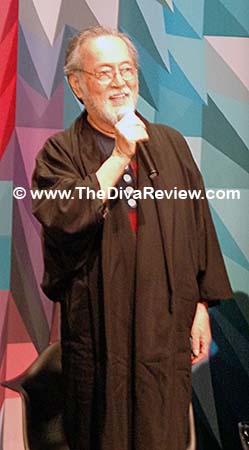 Tatsuya
Nakadai: Iíve turned 81 now, so my memory is not what it used to
be. Is it all right if I refer to notes from time to time?
Tatsuya
Nakadai: Iíve turned 81 now, so my memory is not what it used to
be. Is it all right if I refer to notes from time to time?
The Lady Miz Diva: That would be fine. The Face of Another is quite an avant-garde project. Did you understand all the different themes when it was presented to you?
TN: {Laughs} Thatís a good question! Director Teshigahara and the original author, novelist Abe Kobo Ė in the past, Iíd been in a lot of plays written by Abe Kobo, so I was familiar with those two individuals and we were all members of the avant-garde film movement at the time, so in that sense, I think I had a grasp of the theme even though it was difficult.
LMD: What was director Hiroshi Teshigaharaís most important direction for you in understanding this character?
TN: First, the makeup. {Laughs} The most important thing was the makeup that I donned. This is a character who lost most of his face, so what we did to formulate that sort of exterior was to use silicone. We covered my skin entirely with makeup and covered over with silicone to get that effect.
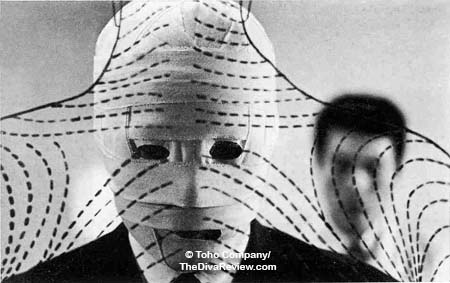 LMD:
An actorís face is such an important instrument. What was it like for
you to spend the first part of the film under bandages relying only on
your gestures and voice?
LMD:
An actorís face is such an important instrument. What was it like for
you to spend the first part of the film under bandages relying only on
your gestures and voice?
TN: For me, personally speaking, the fact that my face was obscured was pleasurable. {Laughs} Iím consistently scrutinized by the camera, but to be hidden underneath that bandage and also underneath the mask itself was very fun for me, actually.
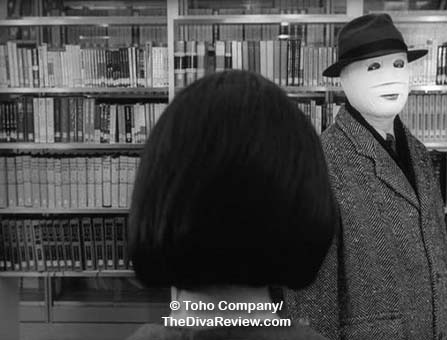 LMD:
There are shots of you walking in the streets with the bandage on and
you can see the publicís reaction to seeing such a person. What was
that experience like?
LMD:
There are shots of you walking in the streets with the bandage on and
you can see the publicís reaction to seeing such a person. What was
that experience like?
TN: We actually used a very specialized way of cinematography, it was a hidden camera. So since the camera was hidden, I would just walk by myself with the bandages on through the crowd and I really expected people to point and look at me, but they actually looked away. Every now and then, a woman would point at me or look surprised. I think the instinct was that they felt sorry for me, so they looked away.
LMD: The politeness of the Japanese people.
TN: {Laughs}
LMD: Besides this experimental piece with Director Teshigahara, youíve also worked with directors who not only changed the Japanese film industry, but changed global filmmaking, as well. Thereís your amazing body of work with Masaki Kobayashi {The Human Condition, Harakiri}, Akira Kurosawa {Yojimbo, Ran}, Mikio Naruse {When a Woman Ascends the Stairs}, Kihachi Okamoto {Kill!, Sword of Doom}, and Kon Ichikawa {Enjo, Odd Obsession}. Did you have a sense at the time that you were doing something new and revolutionary?
TN: Yes, absolutely, I had that recognition, because at the time, Japanese cinema was very focused on capturing both the ordinary and the extraordinary, so a lot of the things that we captured tended to be existentialist, as well. In the films, there were influences by Camus or Sartre, different philosophers. In the theater, we referred to Brecht, so in that sense there was a lot of inclination towards existentialism and extraordinary references were very strong.
In that sense, I thought this piece - that was based on Abe Koboís work - was something altogether very different from works by Kurosawa, for instance.
LMD: Working with all those amazing filmmakers, were you never inspired to direct a film yourself?
TN: No. {Laughs} Never.
LMD: Your versatility has enabled you to play characters in any era, from modern, experimental pieces to classical jidaigeki roles. Do you have a preference?
TN: It embarrasses me a little to say that Iíve been over 110 films and in all of those films what I aspire toward is to understand what Abe Koboís intent was when he was writing this work. So to understand that was very important to me, and that goes for all the films that Iíve been in.
Do you know Yukio Mishima?
LMD: Yes, I do.
TN: I was very close with him and we were friends. We starred together in a film, Hitokiri, and he actually passed away exactly one year after Hitokiri. So actually Mishima wrote a review for Abe Koboís original novel {The Face of Another} and Iíd like to read that if I may?
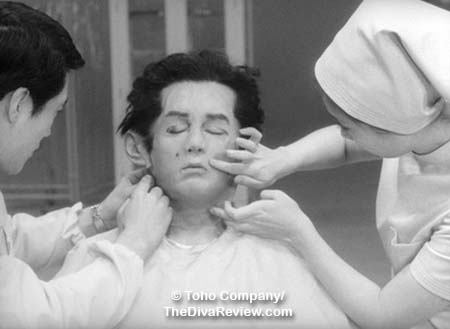 LMD:
Please do.
LMD:
Please do.
TN: Mishima wrote that to pursue the question of what it is to create a mask is something that really shakes not only just the everyday world, but the universe itself. "When you investigate the problematic nature of the work of making a mask, you will soon understand that it is a tremendous work that could crack the order of the universe and derail the cycle of nature. It is a complete revolution of cognition. If a single perfect mask were to appear in this world, the destruction of social order will soon follow."
Now that Iíve been in The Face of Another - I read the original novel and I starred in the film - and I reflect back on it now and it really makes me realize that the Japanese people, whatís very important to them is not the exterior but the interior Ė the heart. That is my own personal reflection of the work. Abe Kobo, I think by writing and presenting this work, he proved experimentally that by changing the exterior, you can actually change your heart. It really has an influence on your heart.
LMD: Are you an actor who prefers very close direction from your director, or are you happiest free to interpret as you see the character?
TN: I think I tend to prefer freedom. Iíve always worked in a manner that I will give it my all; Iíll do it to my heartís content, and then the director will tell me, ďYou can tone it down a little. You donít have to go so far.Ē Thatís the way Iíve always worked and I think I donít really prefer that oppressive type of direction. So, one of the things that really tormented me while shooting The Face of Another, was that I was supposed to remain expressionless, and I was wondering how I can give a performance while remaining expressionless?
LMD: Was there one particular director who suited that preference best for you? Your most productive collaboration?
TN: Kobayashi {Laughs}
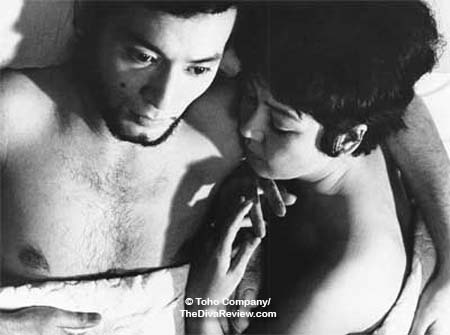 LMD:
We met years ago and I asked how you achieved such a strong, masculine
presence on screen that is rarely seen now in todayís Japanese films. What advice would you give to young actors who also would like to have
that quality?
LMD:
We met years ago and I asked how you achieved such a strong, masculine
presence on screen that is rarely seen now in todayís Japanese films. What advice would you give to young actors who also would like to have
that quality?
TN: In reference to Japanese actors, while here in New York, whenever have free time, I take in a Broadway show. I intend to watch eight shows before I leave this time. American actors on stage, Iím struck by how powerful and skillful they are, and at the same time that Iím inspired, I also feel very regretful and sorrowful because I cannot say the same thing about Japanese actors. My generation of actors - not only actors, but directors - went through so much training and I wonder why the younger generation of Japanese actors today donít train as hard?
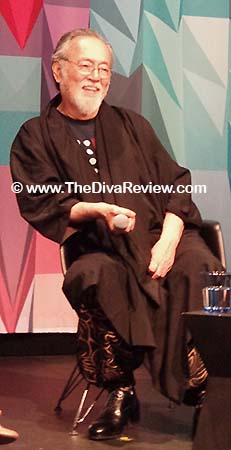 LMD:
Would you please give a message to your US fans who are so inspired by
you and wish you continued health and success?
LMD:
Would you please give a message to your US fans who are so inspired by
you and wish you continued health and success?
TN: I can say that in Japanese cinema right now compared to the golden era of the past, itís actually at the very bottom. Itís the pits. I can say that now. Iím over 80 now, and Iím scheduled to do a one man show, Barrymore. Something in me tells me that will be my last work.
LMD: Considering your feelings about the current state of Japanese cinema, do you find it ironic that some of your films have been remade recently?
TN: Harakiri, the film by director Kobayashi was remade in Japan and the answer is I havenít seen it. Kurosawaís Tsubaki Sanjūrō {AKA Sanjuro} has also been remade and I havenít seen it.
~ The Lady Miz Diva
May 17th, 2014
With many blessings and gratitude to the Museum of the Moving Image, Ms. Tomoko Kawamoto and the invaluable assistance of Ms. Marie Iida.
© 2006-2022 The Diva Review.com
|
|
































